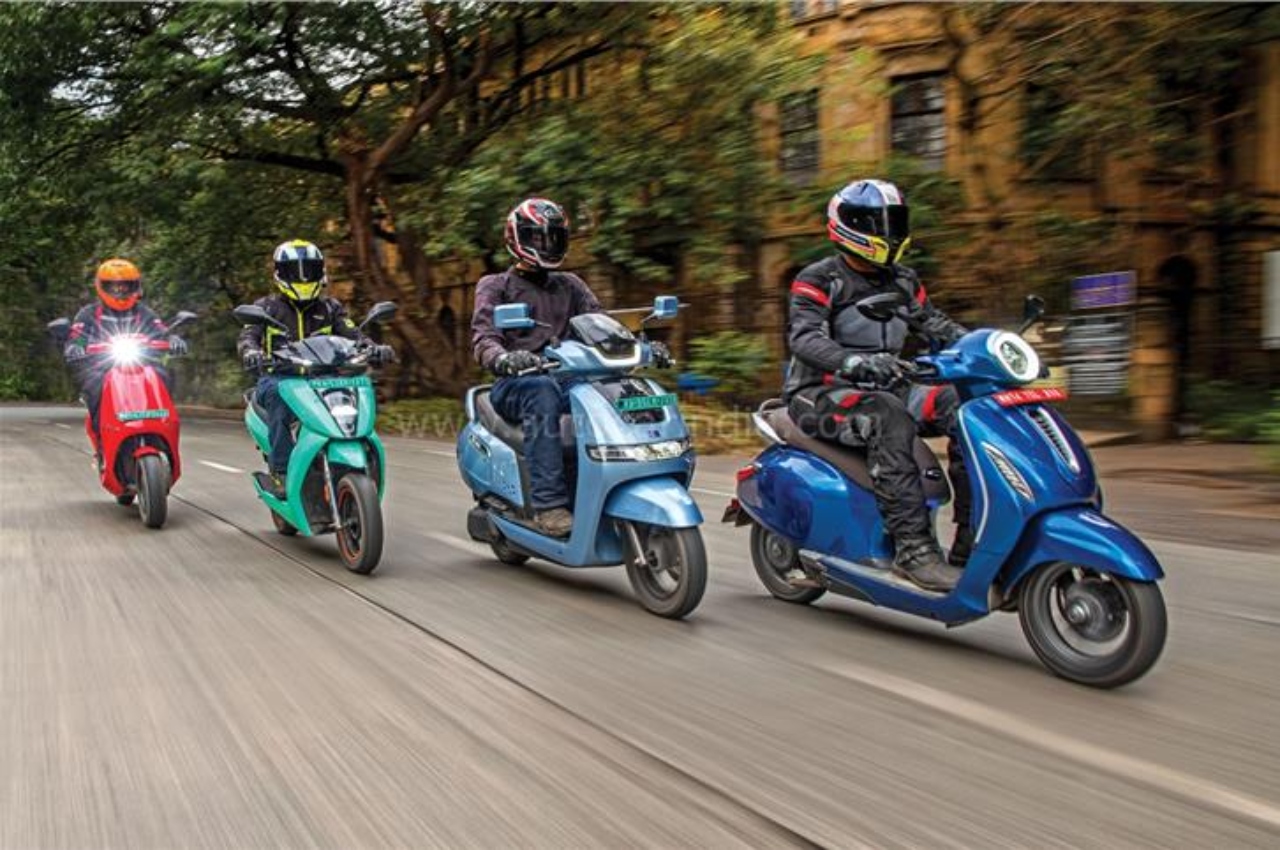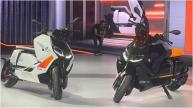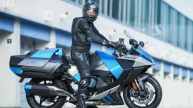New Delhi: Everyone is struggling to have an affordable yet convenient means of transportation. As of today, Ather 450X, Ola S1 Pro, TVS iQube and Bajaj Chetak are the best electric scooters you one buy, but choosing the best among them has turned out to be quite a challenge.
EV scooter comparison: Performance
The Ather 450X and Ola S1 Pro are e-scooters from two of India’s best-known EV start-ups. Their performance-focused approach to e-scooter manufacturing is clearly evident in the size of their electric motors and batteries.
The Ola S1 Pro is the most powerful e-scooter here and makes 58 Nm. Needless to say, it is the fastest when it breaks the speed of 60 km/h and even 80 km/h, with quite a big lead over the others. Even its Vbox-verified top speed of 99.8 km/h is much faster than the Ather, which tops out at a GPS-rated 80 km/h. The indicated maximum speed is 115 km/h for the Ola and 90 km/h for the Ather.
Speed
If you are after faster speeds, the Ola S1 Pro is unbeatable. This means that its initial acceleration from 0-30 km/h is a bit dull and not as fast as the Ather. What’s more annoying, though, is the way the S1 Pro cuts power the moment you touch the brakes.
In the case of the Ather 450X, Eco mode is quite usable even when the battery percentage drops below 10 percent. The scooter will also climb overpasses with such a low state of charge, even if up to 40 km/h. Put the Ather into ‘Ride’ mode and you’ll find it offers plenty of power for your daily commute.
The ‘Sport’ and ‘Warp’ are of course for those willing to sacrifice battery range for performance, and as our test results show, the Ather is the second fastest scooter here. More importantly, the thermal management of the 450X is so good that you can ride it in ‘Warp’ mode as long as the battery state of charge (SoC) is above 20 percent. It also has the best throttle response and feedback of all.
So it is clear that Ather and Ola will satisfy the needs of those looking for a performance-oriented e-scooter.
Conversely, the TVS iQube and Bajaj Chetak are aimed at those who want comfortable, easy-to-drive urban transport that’s still reasonably fast. And in this regard, TVS is a step above Bajaj.
Accelerating from rest, the iQube S accelerates to 40 km/h quickly, but also in a way that doesn’t overwhelm the rider. That’s something new EVs will love. Eco mode limits speed to 50 km/h, which is a typical pace in most cities, while Power mode allows you to reach an indicated 80 km/h.
The ability to maintain these speeds means the iQube doesn’t feel out of place even on a faster-flowing highway. What you will have to get used to on the iQube is the aggressive engine regeneration when you close the throttle. We think it’s a little too strong and doesn’t feel very natural, although that’s something the company can address in a software update.
In comparison, the Chetak’s top speed of 69 kmph is a bit compromised on Mumbai’s wider and faster roads like the Eastern and Western Expressways that criss-cross the city. Instead, the Chetak focuses on providing adequate performance in the city. And while it’s slowest to get to 40km/h or even 60km/h, the difference in time it takes to reach that goal isn’t huge compared to the TVS.
We all also appreciated that the Chetak automatically switches from Eco to Sport mode if you turn the throttle halfway. So let’s just say that in situations where you want to overtake quickly when climbing a flyover, there’s no need to hunt for the mode switch and demand more power like you have to with the other scooters here.
Comfort
The moment you jump into the Chetak saddle, you will appreciate its wide and well-shaped saddle. The floorboard is roomy enough to fit my size 11 shoes and is also set at a suitable height relative to the handlebars. The riding triangle is absolutely spot on and a similar case is with the TVS iQube. In fact, the iQube has the best seat for two. The decades of two-wheeler manufacturing experience that TVS and Bajaj have accumulated have certainly helped them improve the ergonomics of their respective scooters.
In the case of Ola and Ather, their relative inexperience and the obvious limitations of packaging given the dimensions of their scooters translate into compromises with ergonomics. The Ather is the least comfortable of the series by some margin, with the smallest seat and high-slung floor, resulting in a cramped riding position, especially for riders taller than 5ft 10in.
The Ola S1 Pro is definitely more comfortable than the 450X, with a flat, long seat and tall handlebars. However, in this company, you can say that the Ola’s floorboard is a little too high, and its curved shape limits the space for comfortable foot placement. It is the only scooter here that has a large spine in the middle of the floorboard that compromises your ability to store a bag or other items at your feet. However, this is compensated by the huge boot that the Ola S1 Pro provides.
Storage space
The advantage of placing the batteries in the floor of the S1 Pro is clearly visible in its massive 36 liter boot. Even with the charger inside, there is enough space for your laptop, office bags or groceries.
The boot will also swallow two half helmets, albeit without carrying the charger. The Ather 450X has the second largest luggage compartment with a volume of 22 liters, which is enough to carry everyday essentials. However, carrying a portable charger inside limits the available cargo volume. Similarly, the iQube’s 17-liter trunk is almost enough for the f










